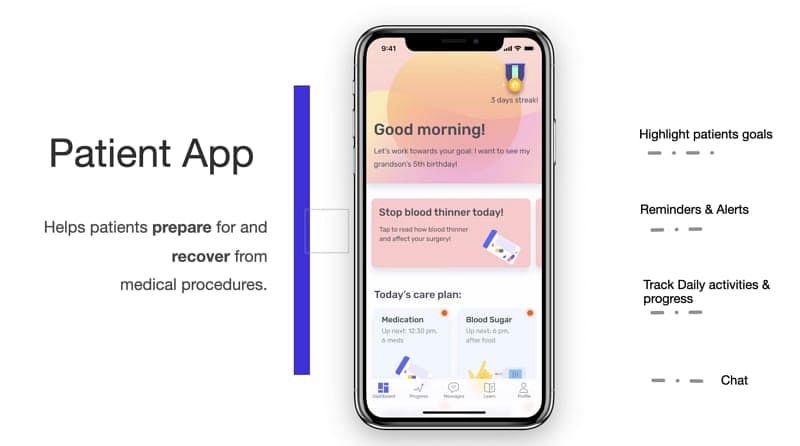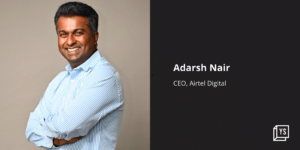With over seven years of experience in global healthcare systems, Prem Sharma understood the key dynamics of both the healthcare systems, and patients needs and attitudes. Having previously been an early employee and Chief Product Officer at Babylon Health – one of the biggest global healthtech startups, he found a serious gap when it comes to aftercare.
Many patients he spoke with needed acute care after undergoing surgery or another major procedure, and they said that they were told very little about the rules and instructions for postoperative care.
“When asked, less than 10 percent of people I spoke to felt they knew what to do day-to-day after returning home from the hospital. In fact, the majority said they didn’t even know what they were supposed to do a mere two hours after leaving the hospital,” recalls Prem, Founder of DayToDay Health.
This was the tipping point for the serial entrepreneur as he realised the severity of the situation. He soon started working on building the foundations of DayToDay and joined the MIT incubator in late 2018, marking the official start of .
The startup focuses on managing virtual patient care – specifically acute, post-surgical, and out-of-hospital care.
The differentiator
The company’s solution started off as a research project at MIT, where Prem was pursuing his MBA, and was launched in January 2019 after doing stringent research for over 2.5 years. Prem’s in-depth research and its innate healthcare domain understanding, coupled with technical expertise and having industry leaders as a part of the team, are the key differentiators and moat for the company.
The startup claims to be the first and only digital-first, end-to-end acute care management company globally. It has over 190 members working across Boston, London, Delhi, and Bengaluru.
How does it work?
Available on both Android and iOS, DayToDay Health’s core offering is a smart technology-enabled end-to-end post-operative acute care management solution, which is duly monitored, tracked, and supervised by clinicians, doctors, and nurses.
“Our solution currently uses advanced data analytics and Natural Language Processing (NLP)-based AI technologies, delivered through a mobile app,” Prem tells YourStory.
Prem Sharma, Co-founder of DayToDay Health
Explaining the patient onboarding procedure, Prem mentions that based on the inclusion/exclusion criteria agreed between DayToDay Health and the hospital, a patient is counselled about the programme either online or over a call.
Once the patient agrees to take the programme, they are registered on the app (along with entering their medical records), and the patient consent is collected.
“At the time of onboarding, we also follow a patient risk stratification process to identify the plan to onboard the patient, thus providing personalisation. This analysis is carried out throughout the programme,” he highlights.
The patient will only see what he is supposed to do on the current day, how he is supposed to do it, and when to ensure he is progressing well daily.
The programme covers 30+ procedures across cardiac, orthopaedics, oncology, urology, and obstetrician and gynaecology.
Business model and traction
The startup works on a B2B model where it partners with hospitals, insurance providers and corporates, which further offer its solution to their patients, customers, and employees. The platform charges the patient a subscription fee for being enrolled in the digital care programmes.
DayToDay Health has already successfully served over 4,500 patients, and has signed 35 contracts with various hospitals, insurance providers, corporates, and government agencies. The platform currently covers a potential patient population of over 1.5 million.
Image Credits : YS Design Team
The impact of COVID-19
DayToDay Health’s acute care management solutions were developed and ready to be deployed towards the end of Q1 2020. The company chose India as the launch market, primarily due to established customer relationships and faster time-to-market, followed by the US in Q2 2020.
However, due to the COVID-19-induced lockdown in 2020, almost all the hospitals across the country had stopped performing elective surgeries, directly impacting DayToDay’s solution rollouts. Even after the lockdown, many hospitals did not resume performing elective surgeries to their full capacities until late 2020. Also, most of the hospitals kept treating COVID-19 patients till Q4 2020. This had a significant adverse impact on customer acquisition and delayed the revenue generation and growth by over two quarters, Prem recalls.
DayToDay then developed a COVID-19 Remote Care Programme in Q2/Q3 2020, and started working with the various hospitals, government agencies, and corporates in India. As its core solution’s full-fledged launch and growth were significantly impacted due to pandemic-induced re-prioritisation of the industry, the company focused on its COVID-19 Care solution.
Towards the end of the year and in Q1, 2021, as hospitals started conducting elective surgeries, the company aggressively pushed for business development, and within a quarter, signed over 30 contracts with some of the leading hospital chains and corporates across the country, and currently has over 60 contracts in the pipeline. This enabled it to onboard patients and resume revenue generation.
In April 2021, as the second wave of COVID-19 gripped India, DayToDay’s Remote COVID-19 Care Programme, which was developed and readily available, was in much demand. One of the key learnings of the company from the pandemic in 2020 was that a significant portion of COVID-19 infected patients could be successfully treated at home through a combination of intelligent technology and trained care coaches. This can be done with due isolation, timely medication and diet, managing anxiety and stress, as well as periodical monitoring from clinicians.
Revenue and the road ahead
The startup has raised close to $15 million, across two funding rounds so far. It makes a monthly revenue of around $100,000.
According to the founder, the startup is in talks with investors to raise more funds towards this month end.
It is present in 10 states, including Karnataka, Maharashtra, Gujarat, Tamil Nadu, and Delhi, besides having establishments in the US, the UK, and Canada.
Speaking about their plans Prem added, “We are looking at some big deals in both territories – India and the US – that will enable us to serve a larger population.”
According to Industry ARC report, the global acute care market size is forecast to reach $214.3 billion by 2025, growing at a CAGR of 6.8 percent during the forecast period 2020-2025.
Prem claims that there are no direct competitors in the space, with DayToDay Health being the first venture in this space globally.





![Read more about the article [Funding alert] DrinkPrime raises Rs 8 Cr from UCIC and WesternCap](https://blog.digitalsevaa.com/wp-content/uploads/2021/07/Cub-1576766516895-300x150.png)




